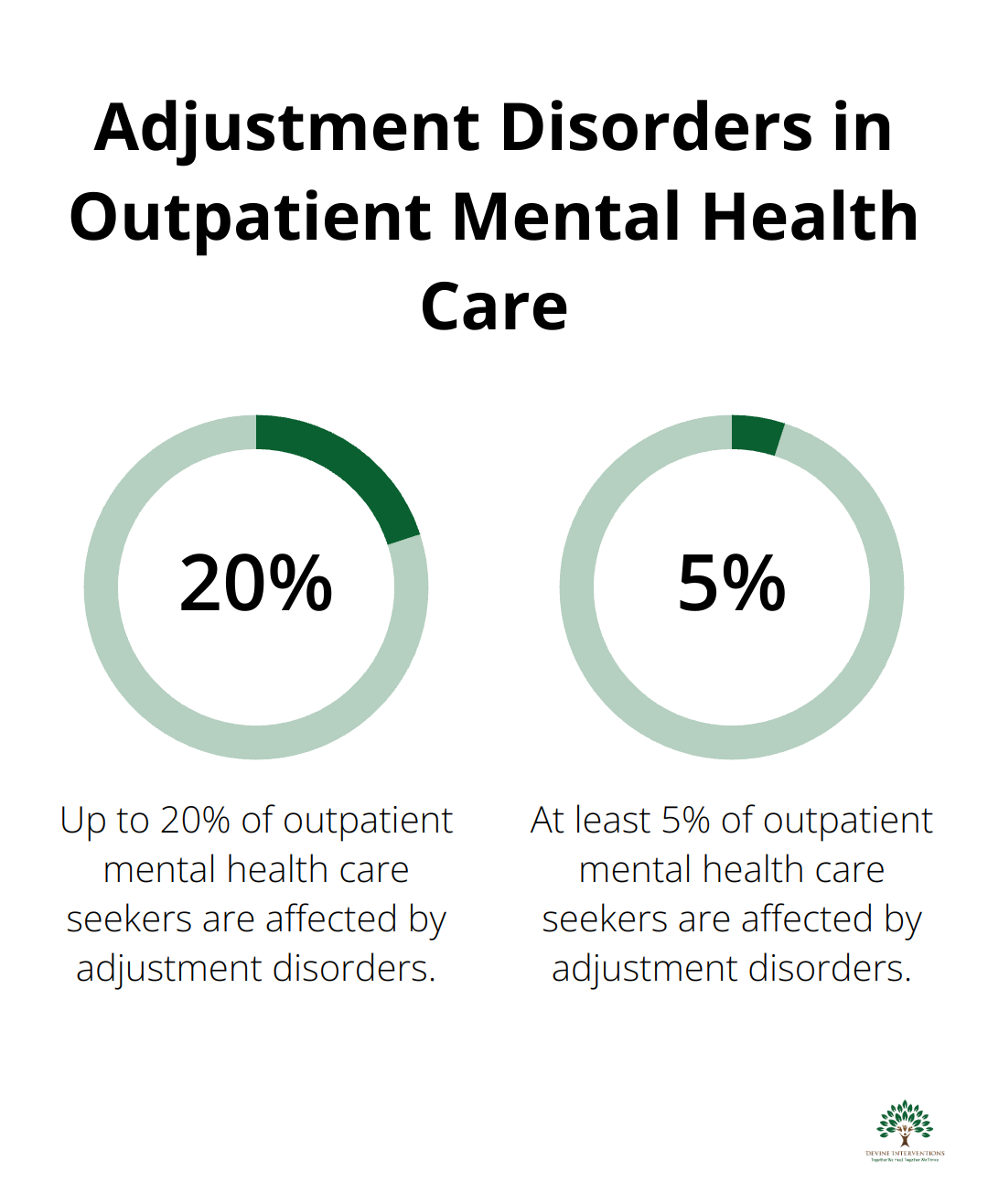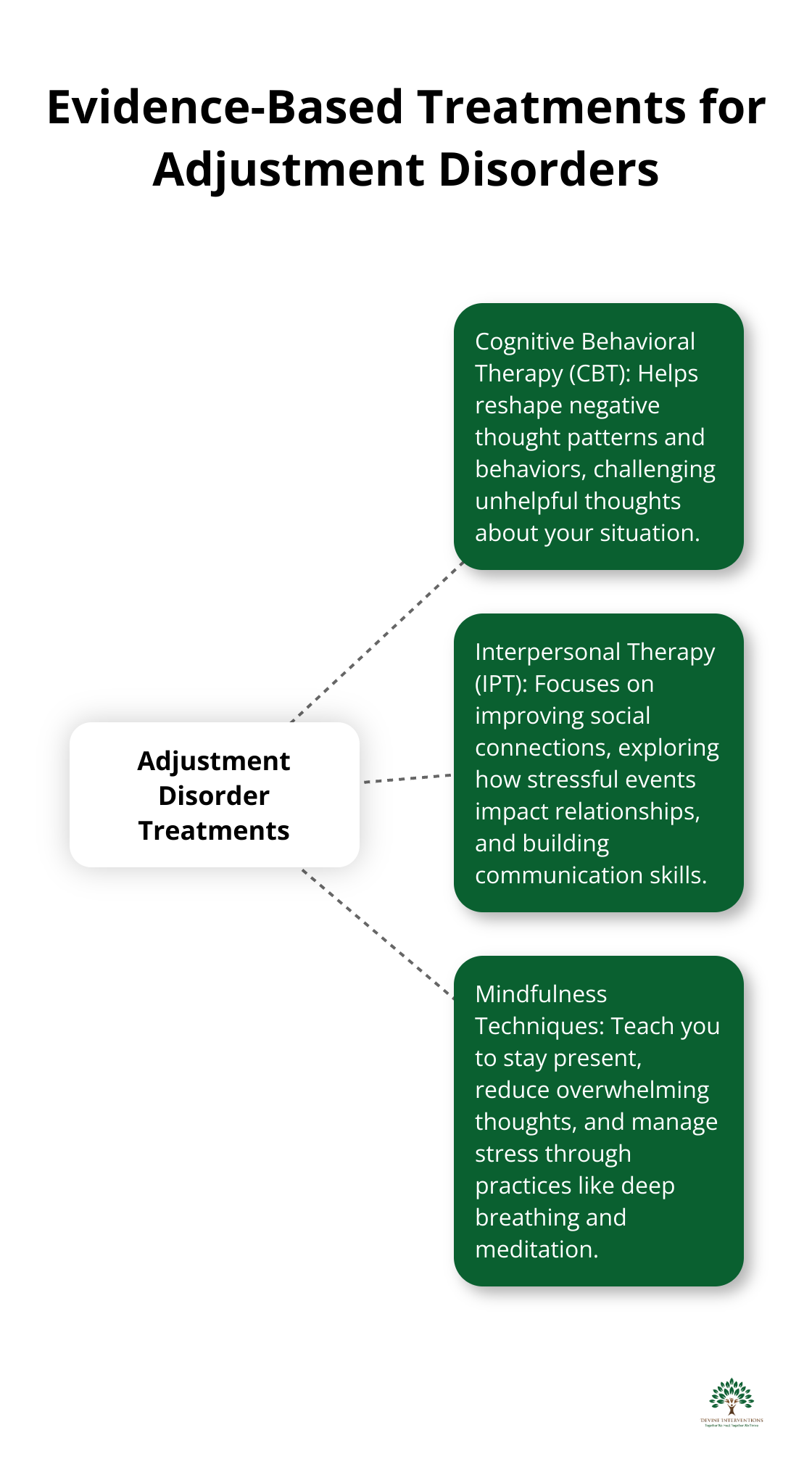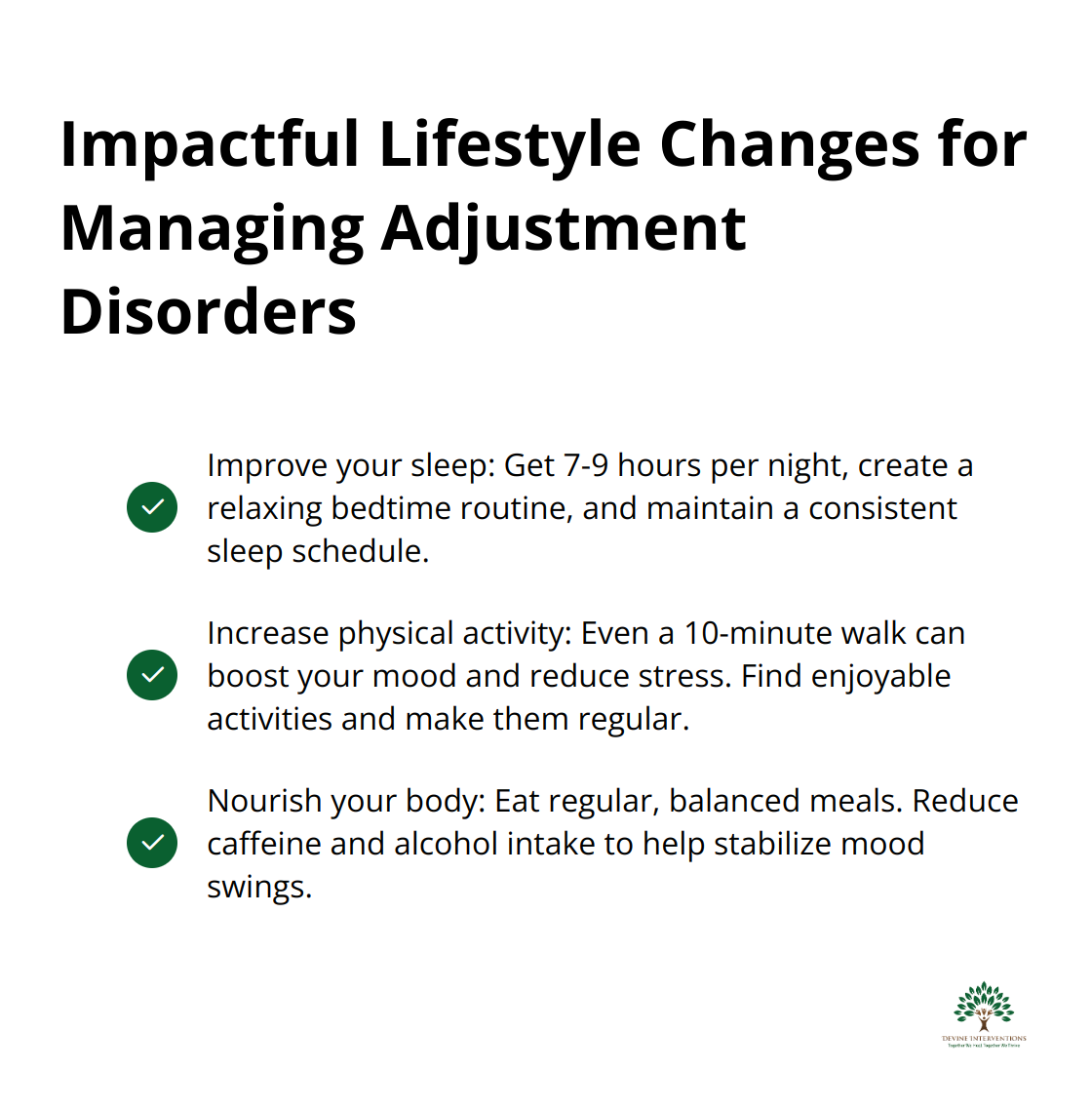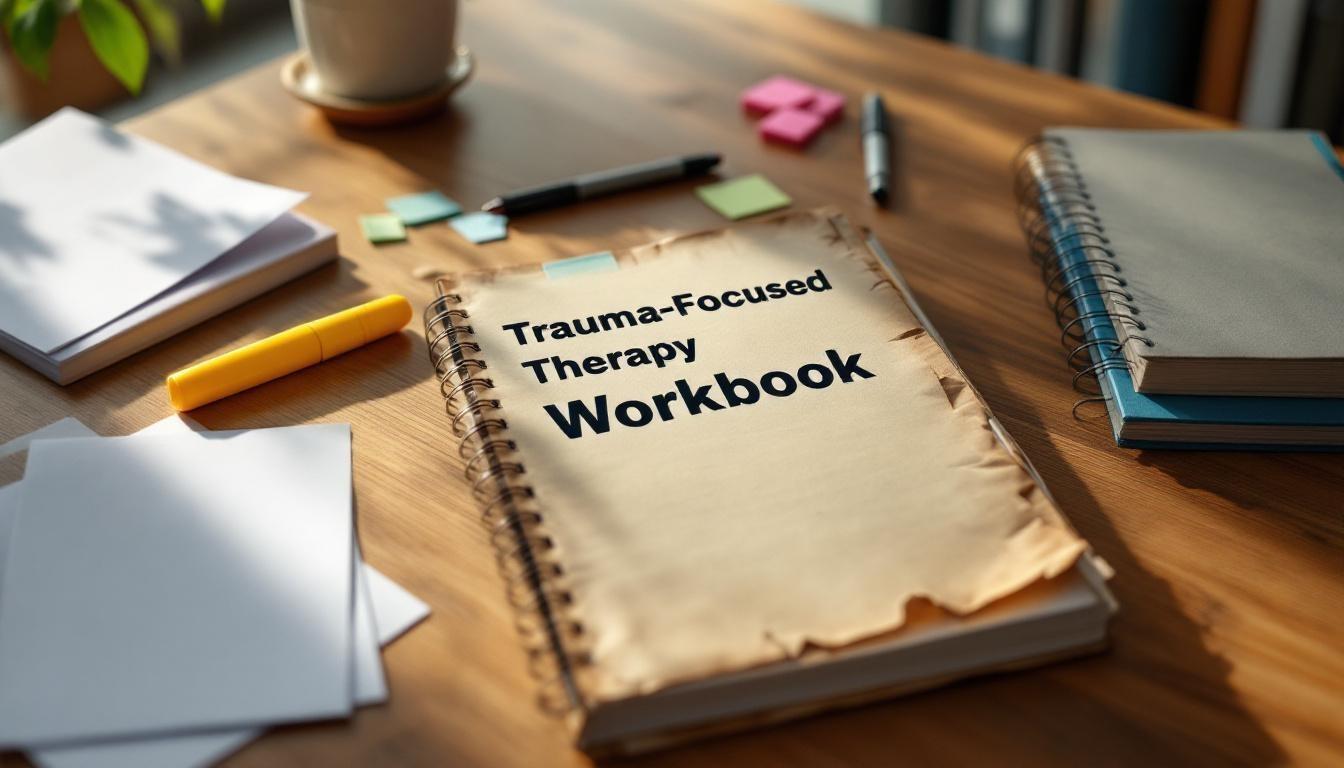Life’s unexpected challenges can sometimes overwhelm us, leading to adjustment disorders. These conditions can significantly impact our daily lives, relationships, and overall well-being.
At Devine Interventions, we understand the complexities of adjustment disorders and the importance of evidence-based treatments. In this post, we’ll explore effective strategies to help you navigate this journey towards recovery and renewed mental health.
What Are Adjustment Disorders?
When Life Changes Hit Hard
Adjustment disorders affect 5%-20% of people seeking outpatient mental health care. These conditions occur when you struggle to cope with a major life change or stressful event. We’re not talking about everyday ups and downs, but significant shifts that throw you off balance.

Common triggers include:
- Job loss or major work stress
- Relationship breakups or divorce
- Moving to a new city
- Serious illness (your own or a loved one’s)
- Death of someone close to you
Your reaction to these events causes more distress than expected. You might feel overwhelmed, anxious, or depressed. Some people act out with behavior changes. Others withdraw from friends and family.
How to Spot the Signs
Symptoms usually start within three months of the stressful event. They can include:
- Feeling sad, hopeless, or anxious
- Crying more often than usual
- Trouble sleeping or concentrating
- Withdrawing from people and activities you used to enjoy
- Physical symptoms like headaches or stomachaches
If you notice these signs in yourself or a loved one, it’s time to reach out for help. Early intervention can make a huge difference.
Not Just “Regular” Stress
You might wonder how adjustment disorders differ from other mental health conditions. The main distinction is their direct tie to a specific stressor and time-limited nature.
Unlike major depression or generalized anxiety disorder, adjustment disorders typically resolve within six months after the stressor ends. However, without proper treatment, they can sometimes lead to more serious mental health issues.
The Importance of Professional Help
Getting professional help is vital. Evidence-based treatments can help you navigate this challenging time and build resilience for the future. At Devine Interventions, we specialize in these effective approaches.
Next Steps: Exploring Treatment Options
Now that we understand what adjustment disorders are and how they manifest, let’s explore the evidence-based treatments that can help you overcome these challenges and regain your emotional balance.
How Evidence-Based Treatments Can Transform Your Life
The Power of Cognitive Behavioral Therapy (CBT)
CBT stands as a cornerstone in treating adjustment disorders. This method helps you reshape negative thought patterns and behaviors. Here’s what you can expect:
- You identify unhelpful thoughts about your situation.
- Your therapist guides you to challenge these thoughts.
- You develop more balanced, realistic perspectives together.
A recent study evaluated the efficacy of grief-focused cognitive behavior therapies compared to mindfulness-based cognitive therapy in individuals with adjustment disorders.
Interpersonal Therapy (IPT): Strengthening Your Relationships
IPT focuses on improving your social connections, which can be particularly beneficial if your adjustment disorder stems from a major life change affecting your relationships.
In IPT, you will:
- Explore how the stressful event impacts your relationships.
- Learn new communication skills to express your needs.
- Work on rebuilding or strengthening your support network.
Research indicates that IPT can match CBT in effectiveness for adjustment disorders, with improvements that last long after treatment ends.
Mindfulness: Your Anchor in the Present
Mindfulness techniques help you manage the stress and anxiety often accompanying adjustment disorders. These practices teach you to stay present and reduce overwhelming thoughts about the future.
Effective mindfulness strategies include:
- Deep breathing exercises
- Body scan meditations
- Mindful walking
A recent study examined how mindfulness, cultivated through a Mindfulness-Based Stress Reduction (MBSR) intervention, influences stress-related symptoms among individuals with specific learning disabilities.
Tailored Treatment: Your Path to Recovery
At Devine Interventions, we customize these evidence-based treatments to your specific needs. Our approach aims to help you not only cope with your current situation but also build resilience for future challenges.

Don’t wait to start your journey towards better mental health. Take the first step today and discover how these powerful, proven methods can help you regain emotional balance and well-being.
As we move forward, let’s explore practical steps you can take right now to manage adjustment disorders and complement professional treatment.
How to Take Control of Your Adjustment Disorder
Build a Strong Support Network
Don’t face this challenge alone. Reach out to trusted friends and family members. Tell them how they can help you. A weekly coffee date or assistance with errands when you feel overwhelmed can make a big difference.
Consider joining a support group. Sharing experiences with others who understand can validate your feelings. Many organizations offer online and in-person groups across the country.
Create Your Stress-Busting Toolkit
Develop a personalized set of coping strategies. This might include:
- Deep breathing exercises: Try the 4-7-8 technique (inhale for 4 counts, hold for 7, exhale for 8).
- Progressive muscle relaxation: Tense and relax each muscle group, starting from your toes and working up.
- Journaling: Spend 10 minutes each day to write about your thoughts and feelings.
Experiment with different methods and stick with what works for you. (What helps one person might not work for another.)
Make Impactful Lifestyle Changes
Small adjustments to your daily routine can have a significant impact:

Seek Professional Support
If you struggle to implement these strategies on your own, don’t hesitate to reach out for professional help. At Devine Interventions, we specialize in evidence-based treatments for adjustment disorders. Our team can help you navigate this challenging time and build the skills you need for long-term resilience.
We offer a range of services, including individual therapy, group sessions, and medication management when necessary. Our approach combines clinical excellence with genuine compassion, ensuring you receive the most effective and personalized care possible.
Take the first step towards reclaiming control of your life. Contact Devine Interventions today to schedule an initial consultation and start your journey to recovery.
Final Thoughts
Adjustment disorders can disrupt your life, but they don’t define your future. Evidence-based treatments offer powerful tools to reshape thoughts, strengthen relationships, and find calm. Cognitive Behavioral Therapy, Interpersonal Therapy, and mindfulness techniques provide effective strategies to overcome these challenges.
Professional help marks a courageous step towards reclaiming your well-being. Early intervention prevents adjustment disorders from evolving into more severe mental health issues. At Devine Interventions, we support you through every step of your journey with personalized care that addresses your unique needs.
Don’t let adjustment disorders hold you back. With the right support, you can overcome these challenges and rediscover balance and purpose in your life (our team combines clinical excellence with compassion). Contact us today to transform your struggle into strength.







